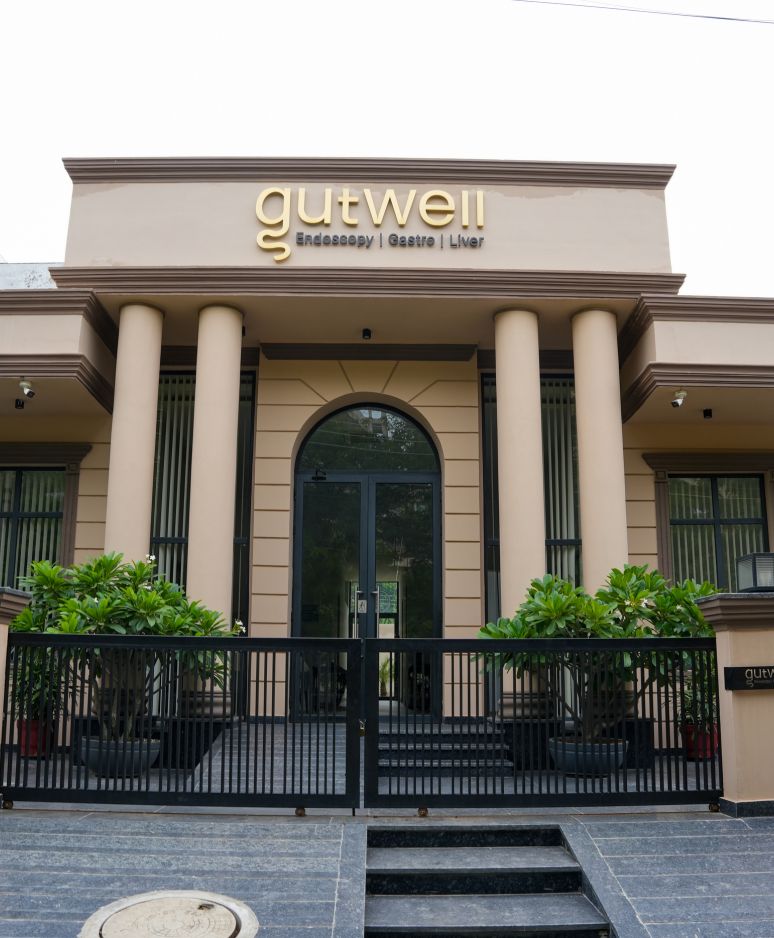
Admin June 24, 2025
Understanding the Difference Between Endoscopy and Colonoscopy
When it comes to diagnosing digestive problems, two common tests often recommended are endoscopy and colonoscopy. While both are vital tools for gastrointestinal evaluation, they serve different purposes, target different areas of the digestive tract, and require different preparations. At Gutwell Clinic, our experienced Gastrointestinal doctor in Gurgaon, Dr. Sukrit Singh Sethi, explains everything patients should know about these two procedures.
What is an Endoscopy?
An endoscopy is a procedure used to examine the upper part of the digestive tract, including the esophagus, stomach, and the beginning of the small intestine (duodenum). It helps identify problems like acidity, ulcers, infections, and even cancers of the upper gastrointestinal tract.
During an endoscopy, a flexible tube with a camera, called an endoscope, is inserted through the mouth. The endoscopy specialists in Gurgaon at Gutwell Clinic ensure the procedure is comfortable and usually done under mild sedation or local anesthesia.
What is a Colonoscopy?
A colonoscopy, on the other hand, is used to examine the lower part of the digestive system – mainly the colon (large intestine) and rectum. It is commonly done to investigate issues like unexplained abdominal pain, blood in the stool, chronic diarrhea, or for routine colon cancer screening in older adults.
This procedure involves inserting a colonoscope (a longer flexible tube with a camera) through the rectum. Colonoscopy specialists in Gurgaon, like Dr. Sukrit Singh Sethi at Gutwell Clinic, use the latest technology for accurate diagnosis and minimal discomfort.
Key Differences Between Endoscopy and Colonoscopy
| Feature | Endoscopy | Colonoscopy |
|---|---|---|
| Area examined | Esophagus, stomach, duodenum | Colon and rectum |
| Entry point | Mouth | Anus |
| Commonly used for | Acid reflux, ulcers, upper GI bleeding | Polyps, colorectal cancer, lower GI bleeding |
| Duration | 15–30 minutes | 30–45 minutes |
| Sedation | Light sedation/local anesthesia | Sedation usually required |
Both procedures are safe and minimally invasive. They may also allow for biopsy or removal of suspicious growths during the same sitting.
When Do You Need an Endoscopy?
You may be advised to get an endoscopy if you have:
- Persistent heartburn or acidity
- Difficulty swallowing
- Unexplained vomiting or nausea
- Upper abdominal pain
- Gastrointestinal bleeding (vomiting blood)
At Gutwell Clinic, our endoscopy specialists in Gurgaon carefully evaluate your symptoms before suggesting this procedure.
When Do You Need a Colonoscopy?
A colonoscopy may be required if you experience:
- Blood in the stool
- Chronic constipation or diarrhea
- Unexplained weight loss
- Family history of colon cancer
- Routine screening if you’re above 50
Our colonoscopy specialists in Gurgaon perform this test with utmost care, ensuring a smooth experience for the patient.
Pre-Procedure Preparationse
For Endoscopy:
- You will be asked to fast for at least 6-8 hours before the procedure.
- Inform your doctor about any medications or allergies.
- Avoid heavy meals and alcohol a day before.
For Colonoscopy:
- A clear liquid diet is usually recommended 24 hours prior.
- You may be given a laxative solution to cleanse the bowels.
- Avoid solid food before the procedure.
- Follow specific instructions given by your Gastrointestinal doctor in Gurgaon.
Preparation is crucial for both procedures as it ensures better visibility and more accurate diagnosis.
What Happens After the Procedure?
After Endoscopy:
- You may feel mild throat discomfort or bloating, which subsides in a few hours.
- Avoid eating for at least an hour post-procedure.
- You can usually return to normal activities the same day unless sedation was given.
After Colonoscopy:
- Some cramping or bloating may occur due to the air introduced during the test.
- If a polyp was removed or biopsy taken, you may be advised to avoid certain foods or activities.
- Rest for the day is recommended.
Both tests are typically day-care procedures and do not require hospital admission.
Are There Any Risks?
Both endoscopy and colonoscopy are safe when done by trained specialists. Rarely, there might be risks like bleeding or infection, especially if tissue is removed during the test. At Gutwell Clinic, our endoscopy and colonoscopy specialists in Gurgaon use advanced equipment and strict hygiene protocols to minimize any risks.
Final Thoughts
Understanding the difference between endoscopy and colonoscopy helps patients feel more confident and prepared. These procedures are essential tools for diagnosing digestive health issues early and accurately. If you're facing digestive discomfort or have been advised for one of these tests, don’t delay.
Trust Dr. Sukrit Singh Sethi, your experienced Gastrointestinal doctor in Gurgaon, at Gutwell Clinic. Whether you need endoscopy in Gurgaon or colonoscopy in Gurgaon, you're in safe and expert hands.
